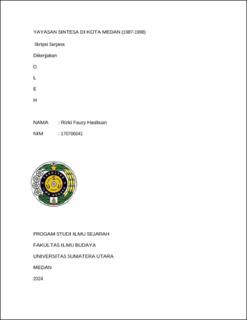| dc.description.abstract | This research focuses on the Sintesa Foundation in Medan City (1987-1998). This research process uses historical methods, starting with determining the topic. Next, in the heuristic stage (source collection), the author uses primary sources in the form of newspapers, articles, newsletters and interviews. Next, use secondary sources in the form of books and journals. The sources are then verified (criticized), through external criticism to obtain the authenticity of the source and internal criticism to produce credibility of historical facts. Then, the verification results are interpreted in the form of analysis and synthesis to produce a historical narrative. Lastly, historiography, reconstructing historical facts that have been collected. The results of the research show that in general the situation in Medan in the 1980s was relatively safe, but in terms of freedom of expression it was silenced by the New Order. Freedom of opinion at that time only applied on campuses when discussing social, economic and political issues. Sintesa initially existed as a forum for discussions and a vehicle for building communication with various study student groups and activists from non-governmental organizations. The synthesis focuses on Appropriate Technology (TTG) in the Lobu Rapa Region as the starting point. During its journey, because of its closeness to the community, especially local farmers, many of them complained about their problems to Sintesa members until then Sintesa experienced a shift in focus, namely advocating for farmers. During its development, Sintesa then transformed into a Non-Governmental Organization in Medan City which continues to deal with agrarian problems. Until finally Sintesa experienced changes in each of its members which led to the formation of the Indonesian Farmers Union (SPI) in 1998. | en_US |



